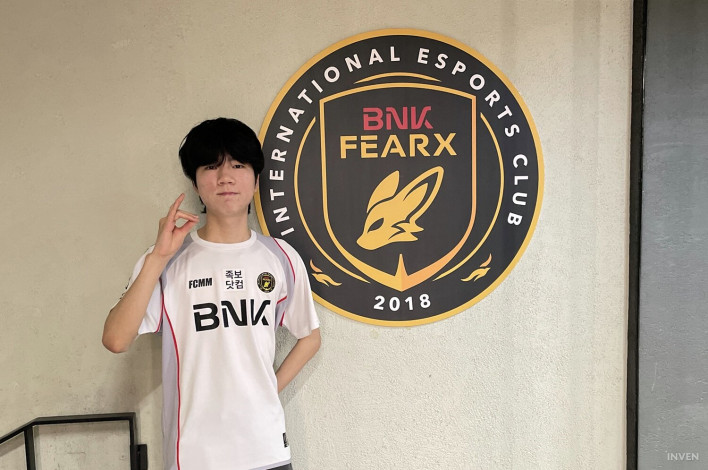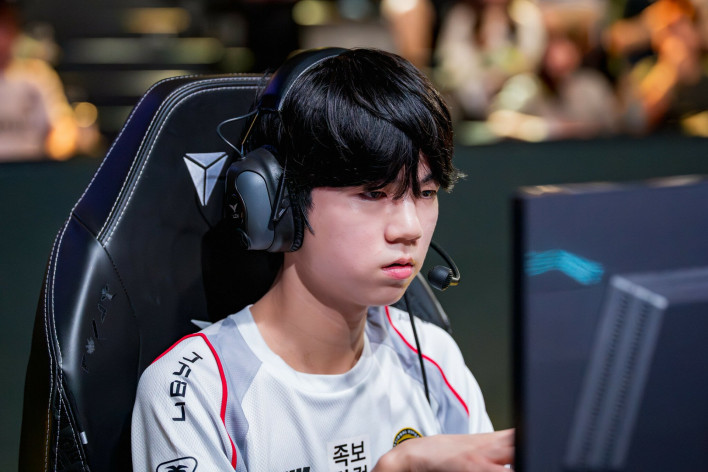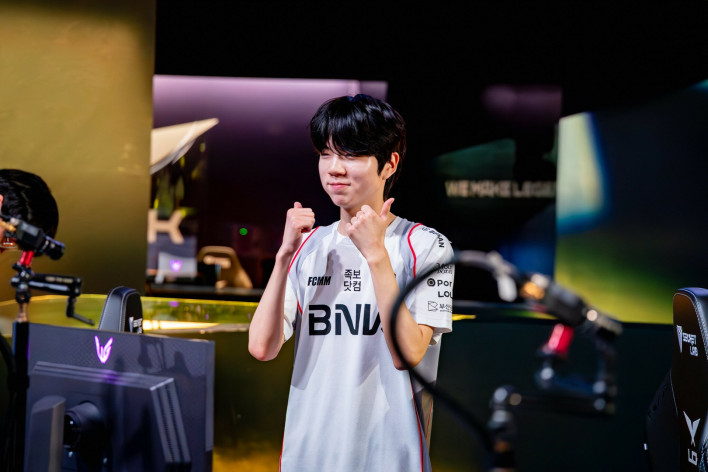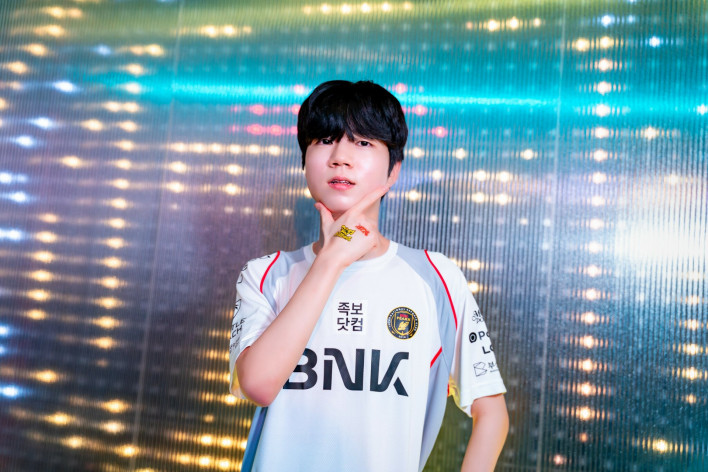
He was the driving force behind the Sandstorm and the Rookie of the Year for the 2025 season. A “one-man army” from the moment he debuted — a little Deft. That is BNK FearX’s AD carry, Nam "Diable" Dae-geun. A true homegrown talent with an aggressive, proactive playstyle supported by stellar mechanics, he immediately became a core member of the team.
Showing performances worthy of the “one-man army” nickname in his debut season, Diabl naturally secured Rookie of the Year. Although BNK FearX finished the LCK in 6th place after a playoff exit, they went on to win the Asia Invitational, an international tournament for mid-tier Asian teams. Diabl earned Finals MVP, proving his level once again.
When we met Diabl at the BNK FearX office after the season, he looked slightly nervous — his first offseason interview. But once the conversation turned to the game, the shyness vanished, replaced by the passion and determination of a rising star. He spoke candidly about the experiences and philosophy that shaped his year.
How are you spending the offseason?
I’ve been catching up with friends — eating out, bowling, going to PC cafés. I’m not an adult yet so there isn’t much I can do, and my friends still have school, so we just hung out normally.
Your friends are high school seniors now. What do they think about you already being a full-time working “adult”?
My friends have to prepare for college, look for jobs, and some will have to enlist soon. But I’ve been a trainee since I was young and debuted this year. I’m just starting to shine, and since they aren’t earning money yet, I think they’re a little jealous of that.
You won Rookie of the Year and even an international title. It feels like a very successful debut season. How would you describe your first year?
It was a year where I did my best with the situations I was given. If I had to score it, I’d give myself 8 out of 10. I took off two points because I feel like I could’ve worked harder and played even better. There were tough periods when I felt like I’d hit a wall — times where despite thinking “this should be enough,” the results didn’t follow, and I couldn’t find an answer to “how do I get better?” Those moments were the hardest.
How did you overcome those difficult moments?
At first, I wanted to work out and improve my physical condition. I think staying in shape is important for athletes — it gives you stamina and clears your mind. But I realized that for us to regain confidence as a team, we needed to start winning scrims immediately. So I dropped everything outside the game and focused solely on playing. As our scrim results improved, my confidence returned too.
BNK FearX definitely struggled early in the season. What did the team do to improve? As a rookie, your position in the team dynamic could’ve been tricky.
When a season starts, I always try to read the team’s personality — whether there’s someone who leads feedback. If not, I step up; if yes, I focus on my own role.
I think the LCK Cup was the period where we were still figuring each other out. We were awkward, didn’t talk much, and that made communication difficult, which hurt our performance. To fix it, I decided I needed to speak up. As we talked more and focused on communication, things improved.
How is your synergy with your support, Kelin? I saw an interview where you said you wanted to play with him.
I worked with a lot of supports as a trainee, and since I’m proactive, I ask for a lot. So I prefer supports with strong mechanics and skillshots since they can cover areas where I lack. That’s why I felt I fit well with Duro in Challengers and thought Kellin would also be a great match.
After spending a full year together, how is it in practice?
Kellin has a lot of experience laning with strong AD carries, and he’s extremely good at 2v2 laning. We meshed well. I ask for a lot, but we both understand the boundaries, and our success rate when making plays is high. Our synergy is close to 100% now.

When did you first decide you wanted to become a pro gamer?
I watched a lot of TV growing up, and back then they broadcast LoL tournaments. The pros looked cool and the game looked fun, so I wanted to become a pro gamer too. I set the dream first and then started playing LoL.
Starting LoL because you wanted to go pro is unusual. Did you climb ranks easily from the beginning?
Yeah, it wasn’t too hard. Around my second year of middle school, a team contacted me, and that’s how I started trainee life.
What did the team see in you? Why were you scouted?
The scout told me later. At the time I was moving between Diamond and Master. I played a lot of Kalista and Lucian, and he said he chose me because even in 1v1 or 1v3 situations on Kalista, I never got scared and played well.
How was trainee life? It must’ve been a drastic lifestyle change.
Honestly, it was really fun. I lived in the countryside, where it got dark early and there weren’t many people. It felt empty and lonely sometimes. But in Seoul, there were people everywhere and the city stayed bright even at night. The other trainees were only 3–4 years older, so every day felt like a school trip.
What did your parents think when you said you wanted to go pro, especially since you were so young?
I’ve always been strong-willed. I didn’t understand why I had to study, so I even ran out of cram school once. Then I quit academy classes and only played games, so of course my parents were worried. But once I got the early trainee offer, I think they started to believe in me.
After going through trainee life, academy, and the second team, you debuted this year. What was the biggest difference?
Once you get to the LCK, you start thinking, “I just need to beat these guys,” so you work harder. In Challengers, even if you beat someone, you know you’ll face much stronger players in the LCK. Also, the facilities improve and you do more fan meetings and broadcasts.
Looking back at your debut season, were there any regrets in terms of gameplay? The team had slumps, and your aggressive strength sometimes backfired.
Honestly, I don’t think I have regrets. I always think about what the best choice is. Every team has strengths and weaknesses, and every player has a role. I think I understood very clearly what role I needed to play. So I made those plays without regret, and most of the time the results were good. Even when they weren’t, trying itself had meaning. There were times I didn’t try, and that never led anywhere. You have to try to grow and have no regrets.
The LCK is full of world-class AD carries, and many strong players returned this year. What did you think going into competition with them?
Before facing them, I thought half of me needed to perform well, and the other half thought, “They haven’t played against me yet either.” You don’t know until you play, so I tried to go in thinking we were equals and stay confident.
Once you actually faced them in matches, what was it like?
At first, I could definitely feel the gap between me and the top AD carries. But it felt like “I can’t beat them right now,” not “I can’t beat them at all.” As I played more matches, the gap closed faster than expected. By playoffs, I felt like, “I’m actually a decent AD carry now,” and played with that mindset.

Do you have personal benchmarks — like wanting to be as good as a certain player?
I’ve never thought, “I need to surpass that specific person.” I think every AD carry is beatable. What I’ve always focused on is whether I’m better than yesterday’s me, and whether tomorrow’s me can be better than today. So if I have a benchmark, it’s “yesterday’s me.”
Compared to the beginning of the year, how much do you think you’ve grown?
I always worked extremely hard on in-game skills from a young age, so I think I was fairly solid when I reached the LCK. But I needed improvement in out-of-game areas. As the season went on and I experienced international competition, those parts improved a lot — especially communication.
What do you mean by “out-of-game areas”?
Mainly communication with people (laughs). And as I beat stronger players in the LCK, I gained more confidence and conviction in what I’d been doing. Winning the Asia Invitational strengthened that even more.
The Asia Invitational debuted this year, and your team not only participated but won the whole thing.
I think you need to make changes every year to keep improving. We lost to Dplus KIA in playoffs. I thought we had issues even before that, but they weren’t easy to fix during the season, and in playoffs we had to stick to what was already decided.
At the Asia Invitational, the teams were closer to our level compared to the LCK, so even if we lost, I wanted to try the things we couldn’t try in the LCK for next year’s sake. I led the team to change our playstyle. We made a lot of early mistakes and almost lost, but we found our footing and ended up winning.
What kind of changes did you make?
It was a style where I take fewer resources, the support helps top/mid more, and I handle 1v1 or 1v2 situations while managing the map. I watch a lot of strong teams, especially through ProView. I think players like Ruler and Viper play extremely well even without much jungle attention. Watching them so much made that style come naturally.
You had an incredible rookie year. What do you want your second year to look like?
We’re not a top-tier team. So if next year I train like crazy, manage my condition well, and improve dramatically, I want to see how far the team and I can go together.
Long-term, what kind of player do you want to become?
I want to retire while people are still applauding. Passion doesn’t last forever. I want to burn brightly while I’m passionate, be remembered as a great player, and retire gracefully.
This is your first offseason interview. Any final message you want to share?
I didn’t start my pro career on a top team. I started on a team people considered weak. But I think most pros start that way. I want to be a player who motivates people like that. I want to prove that even if you start at the bottom, you can become the best.

This article was translated from the original that appeared on INVEN.
![]()
- Yeonjae "Arra" Shin
- Email : arra@inven.co.kr

Sort by:
Comments :0